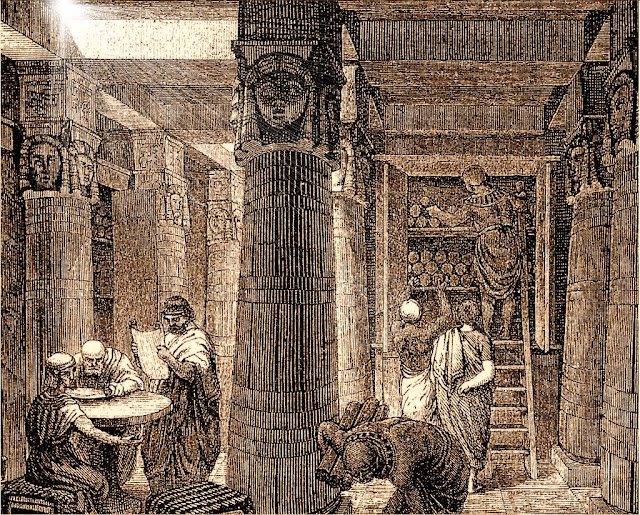History Teaches Us Everything
It is in history that we understand who we are as a collective and who we are as individuals, it is whom we seek to be and whom we become. What value do we place on history? I could not think of a better time to honor the importance of historical preservation than in July, the month that honors Julius Caesar.
 |
| By Wikimedia (Wikimedia commons) [CC BY-SA 4.0 (http://creativecommons.org/licenses/by-sa/4.0)], via Wikimedia Commons |
For the past year, I have been conducting Hellenistic research, which has led my studies down the corridors of the great Alexandrian Library. As many may know, this library and museum once held between 400,000 and 700,000 scrolls. Many individuals often equate the destruction of the library with Hypatia’s murder in 415 A.D. However, this tremendous source of knowledge began its decay in 48 B.C., over four hundred years before the religious uprisings, because of Julius Caesar. In a civil war with Ptolemy XIII, Caesar started a fire in the docks, which spread to the library.
Caesar was a man of propaganda and stories, which could explain why the stories of this great fire are inconsistent with others. Regardless, one wonders that if it wasn’t for Caesar, who knows how much might have remained of the original library before it saw further decay. Here is my historical blog on Julius Caesar.
The Decay of Greek Intellectualism
A long while after Caesar’s death, his nephew, Augustus Caesar, rose to power. By the time Augustus ruled Alexandria, and it fell under Roman province, the Temple of Cesarean became a public library. The citizens of Alexandria witnessed decay during the destruction of the Kitos War in 115 A.D., and for over 100 years, there was peace. However, in 270 A.D., the Attack of the Aurelians destroyed much more of the museum. In 365 A.D., an earthquake in Crete caused a tsunami in Alexandria. Efforts to preserve the library continued as scholars and academics moved as many scrolls as they could away from the library and into the Temple of Serapis. However, despite these efforts to preserve the great Library of Alexandria, along with its other public libraries, intellectualism decayed.
When Alexandria fell under the rule of Christian Patriarch Theophilus in 391 A.D., he ordered the military and people of Alexandria to destroy the Temple of Serapis and convert it into a church. In 412 A.D., Alexandria’s ruler, Christian Patriarch Cyril ordered his people to convert the Temple of Caesareum, which was also a library, into his headquarters. It was here in 415 A.D., at the Temple of Caesareum, that a Christian mob violently murdered Hypatia, the University’s first female professor, and female mathematician. The timing of her death is significant, because, though many believe that the destruction of the library came around Hypatia’s death, clearly the library fell under destructive conditions for 300 years prior.
For two hundred years after Hypatia's death, Alexandria fell into the hands of the various opposition, who continued their destruction upon the libraries. Finally, in 642 A.D., Alexandria fell under Arab-Muslim Caliph Omar’s rule. In its conquest, Omar stated that if the scrolls contradicted the Islamic faith, then his military was to burn the scrolls. Omar then stated if the scrolls supported the Islamic faith, the books were unnecessary, and his men should burn them. As such, Islamic military burned all the remaining scrolls in the great Alexandrian library.
History teaches us where the flags of danger are planted.
It all began with Caesar. Had it not been for years of fighting and wars, would we still have a library today? Would we have more traces of our mathematical origins had Alexandria’s great library withstood the fires, tsunami, and religious uprisings? Moreover, would we have had more to rely on when anti-intellectualism began its uprising in 400 A.D.? Most importantly, what can we learn from this today? How can we preserve knowledge without seeing any traces of intellect falter? Insight builds upon insight. History teaches us everything. History teaches us where the flags of danger are planted. History teaches us how not to repeat past mistakes. Moreover, history guides us away from imminent destruction. It is up to us to let history be our guide.
Yes, Julius Caesar was a tremendous military man. However, he was also clever with propaganda. He was also very adept at accusations, falsehoods, and manipulations, all for political gain. The more his kingdom was under threat, the more propaganda he created. Whether it was true or not he used that to his advantage. July is the perfect time to look at history and use Julius Caesar as a reference as we enter into a new age of anti-intellectualism and viral falsehoods.
As propaganda surrounds us everywhere and seeps out of every corner of social media, what are we using as footholds to ensure that our truths and our forefather’s truths are still self-evident? I think that America, and the world, is facing intellectual regression. I would like to think that, as a society, we will have an advantage over the future and anti-intellectualism if we protect and persistently utilize our libraries, our museums, our arts, our knowledge, our information, our insights, and our histories. That said, to what extent will we go to preserve and protect our past knowledge and the foundations to our future insights?



Comments
Post a Comment